
Pickle juice isn’t just the liquid surrounding pickles. It’s also a delicious briny treat that’s home to some interesting compounds. It may even decrease nausea and muscle cramps, which is pretty impressive. But, is pickle juice good for your liver?
This isn’t a question with a clear cut answer. On one hand, pickle juice could help with your liver in a variety of ways, as it contains antioxidants and probiotics, can help with blood sugar control, and may even help with detoxing. Yet, there are some issues with pickle juice too, such as the sodium content, which can easily lead to long-term health problems.
For most people, the benefits and risks aren’t that dramatic. This means you could easily try pickle juice for yourself and see what effect it has. Or, read on to learn more about the specific benefits and risks you can expect.
P.S. If you’ve already decided, why not try a pickle of the month club? These are one of the tastiest ways to experience all the benefits of pickle juice – without any effort on your part.
Benefits Of Pickle Juice For Your Liver

Can Help With Hydration
First, pickle juice contains a decent amount of water, so it helps with hydration in that way. It’s also a source of electrolytes (much like coconut water and Gatorade).
These electrolytes are important, as they play critical roles in fluid balance throughout our bodies. Getting enough water and electrolytes ensures that everything functions as it should, which is excellent news for your liver.
The Probiotic Content
Pickle juice can be a rich source of probiotics too. These are beneficial microbes that work in conjunction with our bodies to improve our health.
Probiotics are relevant because we have many healthy microbes in our gut, but these aren’t always present in the right balance for optimal health. Consuming the right probiotics at the right time can make a noticeable difference.
Some studies have even found direct evidence that probiotics can promote liver health in a variety of ways. The linked study focused on patients with fatty liver disease, but some of the effects may be true for healthy people as well.
It Contains Antioxidants
Pickle juice also contains antioxidants. These plant-based compounds are often talked about for their potential to decrease oxidative damage and inflammation. Getting sufficient antioxidants in your diet might even help to lower your risk for some diseases.
Now, pickle juice isn’t the absolute best source of antioxidants (there are plenty of more powerful options), but this doesn’t matter. Getting small amounts of antioxidants from a wide variety of sources may be much better than relying on a couple of the most potent sources, as you’re getting a variety of antioxidant types.
May Help With Blood Sugar Control
Pickle juice may also be relevant for blood sugar control. This important effect helps to reduce a variety of health complications that come from notable changes in blood sugar levels, including potential damage to the liver and kidneys.
However, this effect is specifically associated with vinegar. This means it’s only the case for pickle juice made using vinegar, rather than fermented pickle juice.
Pickles made with vinegar aren’t fermented, so they won’t contain the probiotics we talked about earlier. So, either you get the blood sugar benefits from the vinegar or you get probiotic benefits. You won’t get both in the same batch of pickle juice.
It Could Have A Detox Effect
You’ll sometimes see pickle juice promoted as a detox aid. In particular, the vinegar in your pickle juice could lead to increased bile production, which then allows your body to flush out toxins more effectively.
It’s easy to see how this shift could then help with your liver and perhaps even improve your health overall.
There’s plenty of debate about the idea of detoxing, whether it works, and related questions, which we won’t get into here. We’ll just end with the idea that pickle juice could have this effect, but evidence hasn’t yet caught up to the claim.
Why Pickle Juice Mightn’t Work So Well
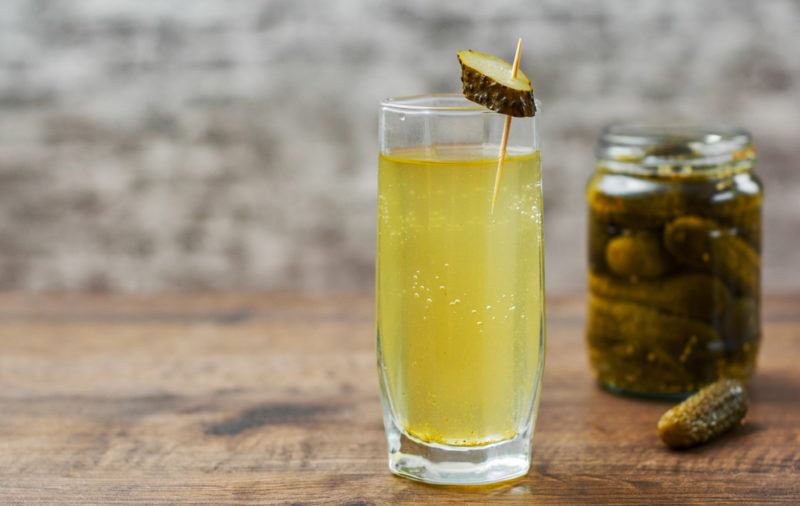
The Sodium
This issue was probably obvious already – pickle juice is high in sodium.
Sodium is indeed an important electrolyte, one that our bodies rely on. However, most of us already consume more sodium than we need, rather than not getting enough.
The sodium content is particularly concerning if you have high blood pressure or are at risk for it, as high sodium diets tend to raise blood pressure. High blood pressure raises the risk for heart disease and can cause a variety of issues throughout the body.
Some research even suggests that too much sodium could cause direct damage to the liver. High sodium intake also has impacts on digestion, which can have many flow on negative effects throughout your body. Some of these could make your liver work harder and raise the risk of harm.
The Probiotics Might Be Low
Probiotics are one of the main reasons to drink pickle juice regularly. Yet, the probiotic content of the juice isn’t guaranteed at all.
For one thing, commercial brands of pickles are often pasteurized. This pasteurization makes the pickles safer, but also kills any beneficial microbes in the process.
Some products are made using vinegar rather than fermentation anyway, so they don’t provide any probiotics at all.
Even if you get a product that should contain probiotics, there’s no guarantee that there’s a decent amount of microbes present. In practice, you don’t know exactly what you’re getting or how it will impact your health.
Probiotics Don’t Always Help
Probiotics have many potential benefits. But, this doesn’t mean you’ll always get all of these – or even that the probiotics will help at all.
Most of the research into probiotics has looked at the benefits of specific strains of microbes for specific health issues, normally in a controlled laboratory environment. In contrast, you don’t know the specific microbes in your pickle juice or their quantities.
There’s also the question of need. Probiotics have the most potential when your gut microbiome is unbalanced. If you already eat well, have a healthy lifestyle, limit your processed food intake, and haven’t been taking antibiotics recently – your gut microbiome may already be well balanced. In that situation, probiotics aren’t likely to help much at all.
There Are Side Effects
Pickle juice doesn’t sit well with everyone. Some people experience considerable side effects, such as bloating, stomach pain, gas, or diarrhea.
The high sodium content of pickle juice can also contribute to high blood pressure and water retention. Both of those effects can cause long-term negative health effects and even put you at risk.
What Does The Evidence Say?

There’s been limited research into the direct impacts of pickle juice on liver health. So, while we know there are some pros and cons for your liver, we don’t know how these balance out.
The effects could also vary between people and situations. For example, if you are healthy, eat well, and aren’t overweight, then pickle juice isn’t likely to cause serious negative impacts.
On the other hand, someone with liver disease or someone who is unhealthy and considerably overweight might have a different response to pickle juice. The risks end up being higher here, while the potential benefits aren’t as notable.
This is why it’s important to be wise. Doing so may include starting slowly with pickle juice, talking to your doctor before using it, and keeping an eye out for any side effects.
Should You Use Pickle Juice If You Have Liver Disease?
If you have a serious health condition, of any type, it’s important to consult your doctor before using pickle juice as a supplement. After all, the juice is acidic and high in sodium, so it will be a very poor choice for some health problems.
However, this doesn’t mean you need to completely avoid pickle juice (unless you’ve been advised to). Drinking the juice every so often is likely to be fine, as pickles and other fermented foods are a common part of many diets and don’t seem to cause issues in that context.
Which Type Of Pickle Juice Is Best?
Pickle juice falls into two broad categories – vinegar-based and fermented.
The vinegar version of pickle juice basically gives you pickle-flavored vinegar, with some nutrients and electrolytes from the pickles themselves. The fermented version relies on salt brine instead. This tends to be higher in sodium, but can be a rich source of probiotics.
The fermented version is often seen as the healthiest approach, as probiotics have been linked to many benefits, including improvements in liver health. However, vinegar-based pickle juice can have some benefits, particularly for blood sugar control.
The best type depends on the set of benefits you’re looking for.
If you are taking the fermented approach, make sure your pickle juice actually contains healthy microbes. This is pretty easy if you’re making the pickles yourself. If you’re buying pickles in a store or online, look for the term ‘contains active cultures’ or something similar. This ensures that the pickle juice hasn’t been pasteurized.
You should probably check the ingredients list too. Some of the jars of pickles sold in stores include dyes to create just the right green color, plus preservatives and other nasties. Most such products are probably low in probiotics as well.
Other Potential Benefits Of Pickle Juice

More research is needed before we truly understand the impacts of pickle juice on the liver. However, there are other areas where pickle juice might be good for your health, including the following.
Pickle Juice For Reducing Muscle Cramps
This is easily the most famous benefit of pickle juice, one that’s backed up by research. Specifically, pickle juice appears to reduce the intensity and duration of exercise-related muscle cramps, even when participants aren’t dehydrated.
More research is being conducted to work out the best amount of pickle juice to use and how strong the effect is. Still, the results are promising so far.
Pickle juice could potentially help with other types of cramps too, particularly stomach cramps and muscle cramps that don’t come from exercise. There’s even the chance that the juice helps with period cramps.
Pickle Juice For Nausea
You’ll often see pickle juice used as a nausea remedy as well. This effect is partly associated with the vinegar and electrolytes in pickle juice (suggesting that vinegar-based pickle juice is the most powerful).
However, this is an area to be careful with, as some people find that pickle juice makes their symptoms worse instead. Pickle juice can also increase acid reflux symptoms, so it’s a poor choice if you experience acid reflux and nausea.
Pickle Juice For Hangovers
Pickle juice is sometimes used as a hangover solution and some people find relief this way. One reason is the sodium and electrolytes in pickle juice. These help to restore your electrolyte balance, which can be powerful after a night of drinking.
Pickle juice also helps to rehydrate you a little (although you should definitely drink water as well). Beyond this, pickle juice is pretty intense. This can sometimes knock the edge off your hangover, simply because you’re focused on something else, rather than your hangover symptoms.
Pickle Juice As A Laxative
While research is minimal, some people find that a shot of pickle juice helps to relieve constipation. The effect is gentle, but may still be enough to help with mild constipation.
Final Thoughts
We’ve covered a lot of ground with pickle juice and liver health. In the end, there is some evidence for benefits, along with some risks to be aware of.
Still, for most people, pickle juice isn’t that big of a deal. You should be able to have a 3-ounce serving semi-regularly without an issue.
Just keep an eye on your sodium intake. If you’re already consuming a large amount of sodium, pickle juice mightn’t be the wisest idea. After all, there are plenty of other healthy foods and drinks that are much lower in sodium.

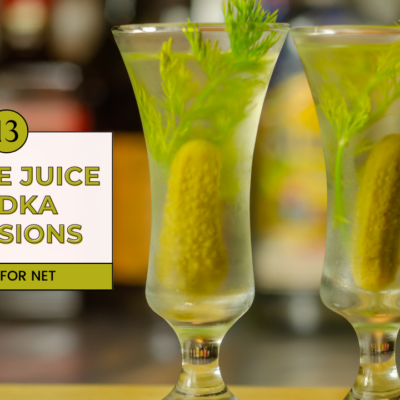
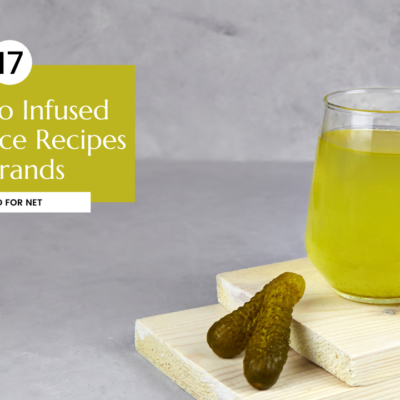
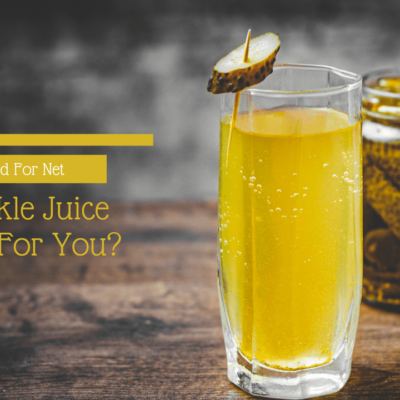

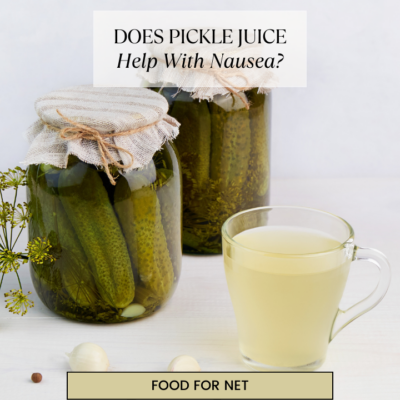









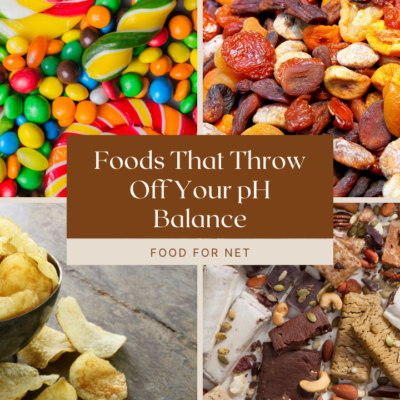
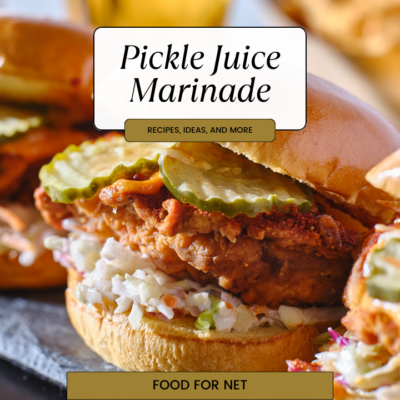
 How Fast Does Pickle Juice Work As A Laxative?
How Fast Does Pickle Juice Work As A Laxative?
Leave a Reply